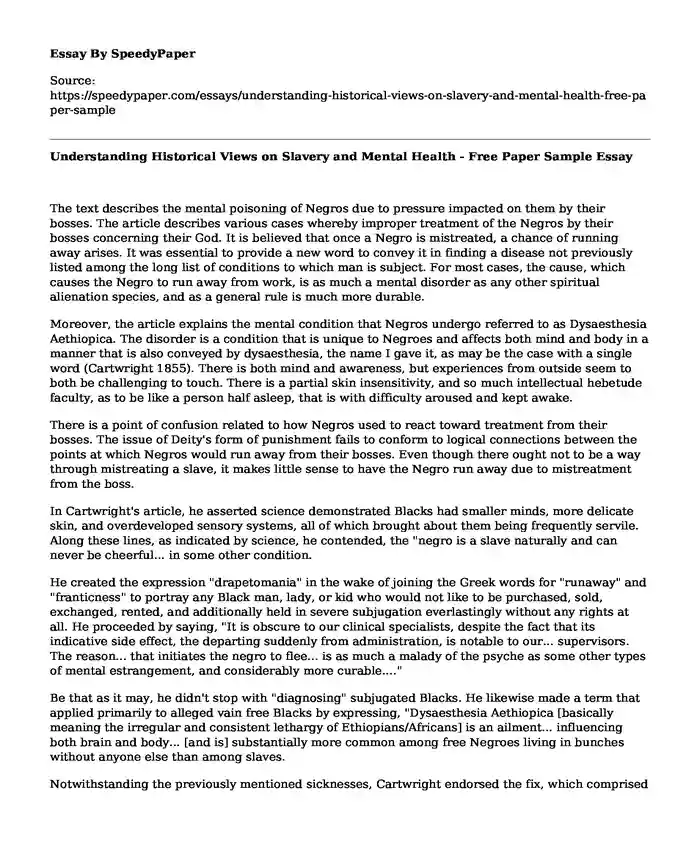
| Type of paper: | Essay |
| Categories: | History Slavery Mental health |
| Pages: | 3 |
| Wordcount: | 622 words |
The text describes the mental poisoning of Negros due to pressure impacted on them by their bosses. The article describes various cases whereby improper treatment of the Negros by their bosses concerning their God. It is believed that once a Negro is mistreated, a chance of running away arises. It was essential to provide a new word to convey it in finding a disease not previously listed among the long list of conditions to which man is subject. For most cases, the cause, which causes the Negro to run away from work, is as much a mental disorder as any other spiritual alienation species, and as a general rule is much more durable.
Moreover, the article explains the mental condition that Negros undergo referred to as Dysaesthesia Aethiopica. The disorder is a condition that is unique to Negroes and affects both mind and body in a manner that is also conveyed by dysaesthesia, the name I gave it, as may be the case with a single word (Cartwright 1855). There is both mind and awareness, but experiences from outside seem to both be challenging to touch. There is a partial skin insensitivity, and so much intellectual hebetude faculty, as to be like a person half asleep, that is with difficulty aroused and kept awake.
There is a point of confusion related to how Negros used to react toward treatment from their bosses. The issue of Deity's form of punishment fails to conform to logical connections between the points at which Negros would run away from their bosses. Even though there ought not to be a way through mistreating a slave, it makes little sense to have the Negro run away due to mistreatment from the boss.
In Cartwright's article, he asserted science demonstrated Blacks had smaller minds, more delicate skin, and overdeveloped sensory systems, all of which brought about them being frequently servile. Along these lines, as indicated by science, he contended, the "negro is a slave naturally and can never be cheerful... in some other condition.
He created the expression "drapetomania" in the wake of joining the Greek words for "runaway" and "franticness" to portray any Black man, lady, or kid who would not like to be purchased, sold, exchanged, rented, and additionally held in severe subjugation everlastingly without any rights at all. He proceeded by saying, "It is obscure to our clinical specialists, despite the fact that its indicative side effect, the departing suddenly from administration, is notable to our... supervisors. The reason... that initiates the negro to flee... is as much a malady of the psyche as some other types of mental estrangement, and considerably more curable...."
Be that as it may, he didn't stop with "diagnosing" subjugated Blacks. He likewise made a term that applied primarily to alleged vain free Blacks by expressing, "Dysaesthesia Aethiopica [basically meaning the irregular and consistent lethargy of Ethiopians/Africans] is an ailment... influencing both brain and body... [and is] substantially more common among free Negroes living in bunches without anyone else than among slaves.
Notwithstanding the previously mentioned sicknesses, Cartwright endorsed the fix, which comprised of cruel whippings and toe removals. He said oppressed Blacks who are "sullen and disappointed without cause" are unknowingly showing a warning of their arrangement to get away. The best approach to smother such agreement, he proclaimed, is by "whipping the fallen angel out of them" as a "preventive measure." And to make any getaway from the arrangement genuinely incomprehensible, he recommended removing the large toe on the two feet. He truly did. How naughtily savage is that? What's more, it happened frequently.
Works Cited
Cartwright, S. A. "Diseases and peculiarities of the Negro race. De Bow’s Review Southern and Western States, Vol. XI, New Orleans, 1851." (2008).
Cite this page
Understanding Historical Views on Slavery and Mental Health - Free Paper Sample. (2023, Nov 07). Retrieved from https://speedypaper.net/essays/understanding-historical-views-on-slavery-and-mental-health-free-paper-sample
Request Removal
If you are the original author of this essay and no longer wish to have it published on the SpeedyPaper website, please click below to request its removal:
- Pregnant Women and Alcohol - Free Essay Sample
- The Catholic Church and Chaucer
- Fugitive Slave Act - Free Paper Sample
- Infection Process - Paper Example
- Essay Sample on COVID-19 as Environmental Injustice
- Wearing of Masks in Wisconsin - Essay Sample
- Nurturing Hope: Literary Inspirations Amidst the Pandemic - A Free Essay
Popular categories




